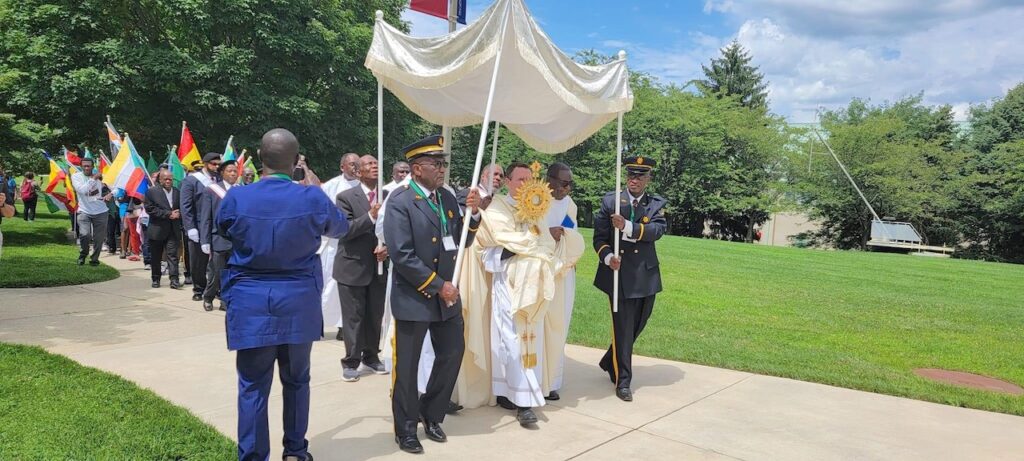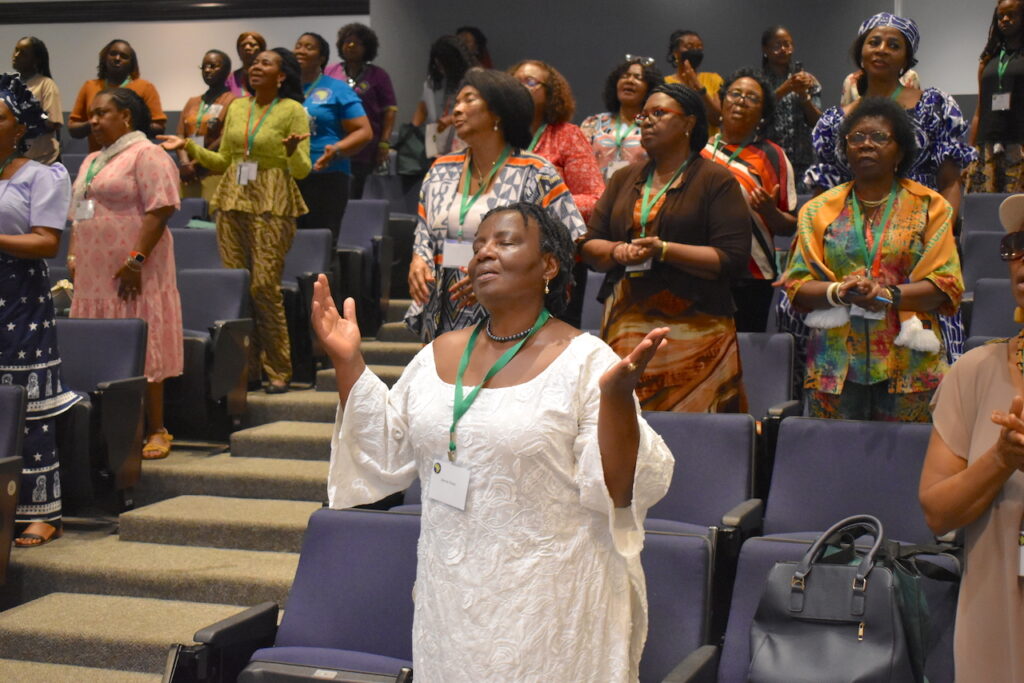WASHINGTON (OSV News) – The African National Eucharistic Congress allows Africa-born Catholics in the diaspora to do something that would have been nearly impossible to do in their homelands: to meet fellow African Catholics and learn about their cultures while growing in love of God.
Some of the estimated 500 participants in the congress – which met in Washington, D.C. July 21-23 at The Catholic University of America – shared the stories of what brought them together to celebrate their faith.
Nigerian-born Father Tochi Iwuji, pastor of Holy Rosary, Richmond, said African Catholics need to “understand they have a place in the universal Church.”
He estimated that more than 30 people represented the Diocese of Richmond at the congress this year. He said, “we got more engagement and participation than we expected.”
“When people move to a different environment, they can get lost. … They have to find a way to live their Catholic faith … without losing who they are. … For them to have the courage to be African in a different culture, while living their faith, is important,” said Father Tochi, also named director of the diocesan Office for Black Catholics last December.
First-time attendee Jordan Atta Nuako is heading into his second year at Norfolk State University, studying electronic engineering. He is from Ghana, and said he feels isolated in the United States since his family is still back home.
“I heard about the congress and wanted to go to renew my faith – and also to meet fellow African Catholics,” said Atta Nuako. He said there are not many African Catholics on campus, and he is hoping to find a community where he can enjoy some fellowship.
Atta Nuako said he felt that he grew in spirituality at the congress, specifically due to the retreats focused on men’s vocations. “I learned a lot about myself, and how to connect with God,” he said.
Different worship experiences
Father Tochi said it is important to make African Catholics “feel welcome in their parishes, to feel they have a voice, and to feel the Church also belongs to them.” He said a big concern is that some African Catholics have left the Church for something they feel is more welcoming.
Father Tochi moderated a retreat for women during the congress. “One of the things I emphasized was for them to be comfortable in being proud of their faith,” he said, “and also to see the Eucharist as a unifying factor. … Even in our differences, the Eucharist binds us all together.”
Michael Miti-Kavuma, who, like many of the congress’ participants, is a native of Nigeria, has lived in the United States for 40 years.
While in Nigeria, Miti-Kavuma might not have made a friend from East Africa, but in the United States “we don’t have a choice. We have to communicate,” he said. And that communication, he added, “comes naturally.”
The experience of worship is different for African Catholics in the states, Miti-Kavuma said. “We don’t know the priest intimately,” as they would have in their towns and villages, he said. In Africa, “the whole village goes to church, so we know who everybody is, pretty much.”

‘Regardless of origin’
Sister Emily Iyelumi, an African-raised Sister of the Sacred Heart of Jesus, now lives with her congregation in New Orleans 20 years after she entered religious life. Being assigned to the United States came with its own challenges, she acknowledged. “You are going to another culture,” Sister Iyelumi said. “How is it going to be?”
But, she said, “it makes me feel warm” that she is somewhere where nearly every other African has experienced the stress of making their way to America, and yet seem to have adjusted well.
At the congress, “we come together as one, regardless of origin,” Sister Iyelumi said.
“We do have the Eucharist,” and with that in mind and heart, she added, “we imagine what heaven is going to look like.”
Ada Chukwu left Nigeria 46 years ago to join her husband, who had left the country earlier to find work in the United States. Despite not being raised Catholic like her husband, she was given the name “Ada” at birth, which in her native tongue means “daughter,” while “Chukwu” means “God.”
“I’m the daughter of God,” she said.
Chukwu said she wanted to grow spiritually at the congress. “To relate to people, to spread the Word,” she added, “to be kinder to people and to understand where they are coming from. They have their baggage, and I should not be so quick to judge. I hope to spread the Good News and behave better than I did before.”
Not every congress participant was born in Africa or has been in the United States for decades. Nneama Ngene, 21, and her 18-year-old sister, Ogoma, both of whom will be attending the University of Pittsburgh come fall, were born in the U.S. to Nigerian parents.
For them, college presents its own hurdles. Not only are they hundreds of miles from home, but there are fewer Black Catholics and a weaker faith network around the campus than at home, where they each went through 12 years of Catholic schooling.
Also attending the congress was Nma Rose Nnoga, another Nigerian native, who arrived in the United States 44 years ago to reunite with her husband, who had come to the states to continue his studies.
Having settled in Camden, New Jersey, to raise her family, Nnoga said she wanted to return from the congress with “peace of mind, to be more open to the love of God – the love of God in the Eucharist.”
Editor’s notes:
Lily Nguyen Dunkle contributed the interviews with Father Tochi Iwuji and Jordan Atta Nuako.
Mark Pattison writes on special assignment for Catholic Standard, the newspaper of the Archdiocese of Washington.

